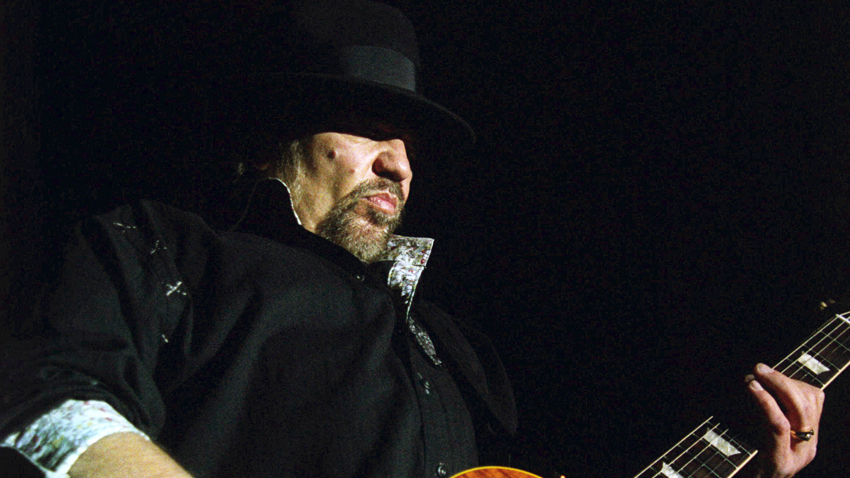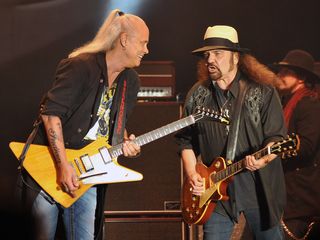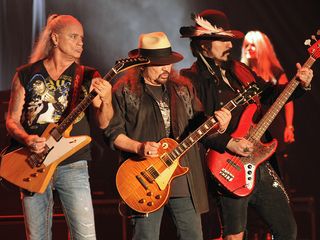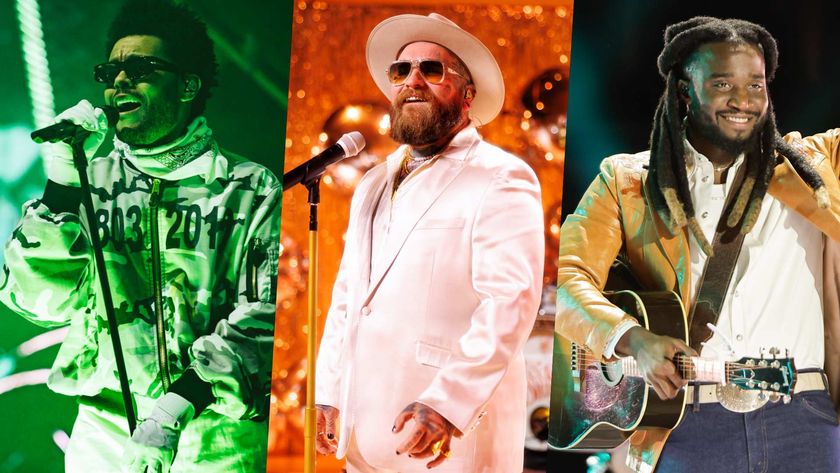
"We just wanted to do it like we did in the old days," says Lynyrd Skynyrd guitarist and co-founder Gary Rossington, talking about the band's new album, Last Of A Dyin' Breed. "In the '70s, we kept it simple. We picked the material, everybody came up with their parts, and then we'd play live in the studio. We made sure the band feel was there."
Rossington admits that the group, at various points in time, especially on post-'70s recordings, didn't always follow a strict play-it-live ethos in the studio. "Sure, we've tried stacking things and building songs from the drums on up," he says. "But that's not how you get the real band feel. We've learned some things over time, and we know how to make a great Lynyrd Skynyrd record. It's all about making the fans happy and keeping the band name alive, you know?"
Spoken by Rossington, the sole remaining member of the original Lynyrd Skynyrd, those last words carry particular emotional heft. Since the 1977 plane crash that took the lives of singer Ronnie Van Zant, guitarist Steve Gaines and his sister, backup singer Cassie Gaines, the job of keeping the Skynyrd name - and sound - has fallen primarily on Rossington's shoulders.
Last Of A Dyin' Breed, with its mix of vibrant rollicking Southern rockers and sweeping ballads, fits nicely in the Skynyrd canon. "Making it was a lot of fun. We just played," says Rossington, who now shares guitar duties with Rickey Medlocke and Mark "Sparky" Matejka (the band also includes singer Johnny Van Zant, drummer Michael Cartellone, keyboardist Peter Keys and former Black Crowes bassist Johnny Colt.
Rossington sat down with MusicRadar recently to talk about the origins of the band's signature triple-guitar approach, what it was like opening for The Who in the early '70s, and to answer that burning question: Is it ever possible to play Free Bird for too long on stage?
One of the band's first big breaks was opening for The Who back in 1974. What was that experience like?
"Man, that was so great. That was the first time we got exposed to a lot of people up North and in the West. Up till then, we were just playing for folks in little teen dens and smaller shows around the South. We hadn't played a lot of big gigs at all. When we got on The Who tour, it was unbelievable. There were anywhere from 10,000 to 20,000 people at every show. That blew our minds. [laughs]
Get the MusicRadar Newsletter
Want all the hottest music and gear news, reviews, deals, features and more, direct to your inbox? Sign up here.
"We thought we were on top of the world during that tour. It was the big time. The Who were crazy guys, man. All that stuff about wild times, getting drunk in hotel rooms and throwing TVs out windows - all true. We got to see that and participate in it. We thought it was great."
Was there any one particular member of The Who that you got to know a little bit on a social level?
"We got to see all of them every day pretty much. We hung out with the crew and the band and talked every night. We goofed around with them and joked around. They were real funny, man. Of course, we were all drinking a lot back then - everybody was - so we'd be drinking in the dressing rooms and getting wild. It was crazy times. [laughs] Keith Moon was the funniest guy around. The stuff he did was insane. He was like somebody straight out of the movies."

Rossington mixes it up with guitarist Rickey Medlocke on stage in Morristown, Ohio, July 2012. © Jason L Nelson/AdMedia/Corbis
Skynyrd's triple-guitar approach - is this a Southern thing? It sure seems that way.
"I think a lot of bands are just copying us. When we got started, we were influenced by the Allman Brothers, but at the beginning they had two guitar players. They used to jam a lot, and different guitar players would get up and play with them, so they'd wind up having three guitarists.
"Buffalo Springfield had three guitar players, and we thought they were so cool. So we started doing the three-guitar thing, and people started calling us the 'guitar army' and all this stuff. A couple other bands came up after us and did what we were doing. You had The Outlaws, Charlie Daniels - even he got another guitar player. There were two or three other bands that might not have caught on. We didn't start it - it just seemed like the way to do things down there."
When you have three guitarists in the band, and we're talking about the current incarnation now, who leads? Is it you?
"When we play new songs, it's whoever plays in what style. I have a slower, more melodic style than Rickey Medlocke or Sparky. They play really fast and do a lot of notes and scales. If a song calls for that, one of them plays it, but if it calls for a different feel, then I'll do it. The ones that the original band did, we just copy them note-for-note. I'll do my part, Rickey will do Allen Collins' part, and Sparky does Steve Gaines' or Ed King's parts. We all have that down. You don't want to mess with the old stuff."
Speaking of which - Free Bird. The live version from Another One From The Road is pretty long.
[laughs] "Yeah, that's long all right."
What's the longest you've ever played it on stage? Do you know?
"Man, back in the old days, we'd have three or four sets a night at certain clubs, so we'd play it for a whole 30 minutes sometimes. We'd just jam on it to the very end. At first, when we did it on record or live, we never did it for more than 10 or 11 minutes, but then we just stretched it out. Seems to me that people would get tired of hearing the same thing for so long, even if it is really good. But it's a fun song to play."
So you never have moments on stage where you're thinking, OK, this has gone on long enough. Can't somebody end this already?
"Actually, no, I never do. It's like it's new every night. When you're on stage, you look out at all the people's faces. They'll be cheering, or sometimes they'll cry. You can feel their emotions - they're reminiscing or singing the song and feeling it. Then, at the end, we take off and soar. Everybody jumps up and down and shakes their fists. It's a real energetic feeling. I couldn't get tired of that."

Medlocke, Rossington and bassist Johnny Colt, possibly in the 20th minute of Free Bird. © Jason L Nelson/AdMedia/Corbis
On the new album, you've dialed down the political tone that ran through God & Guns. It's there, but it's not in your face. Given that we're in an election year, that's a little surprising.
"Actually, it's because of the time we're in. I think with all the news shows and bombardment of political messages that you get all day, because of the year we're in - and the last four years have been political - we just wanted to make music that didn't preach. People get enough of that on the news, so we just said, 'Let's stop talking about all that stuff.' Sometimes music isn't the way to talk politics, you know?"
Even so, Skynyrd did perform at the 2012 Republican National Convention a few weeks ago.
"When we were doing that, we got a lot of talk. What we were doing was, we were invited to play for the Wounded Warriors. It was a benefit for the soldiers. It just happened to be held at the convention. We went and played for them. We do a lot of stuff for the soldiers and the military; we're really behind them. So we're always trying to go see them in hospitals and play benefit shows for them whenever we can."
John 5 contributed to some of the writing and guitar playing on the new album. You've worked with him before.
"Oh, yeah, he's a freak of nature, man! [laughs] What a great guy - and a great guitar player. We get along with him real well, 'cause he's just a real sweet person. For God & Guns, when we met our producer, Bob Marlette, he was already big friends with John, so he turned us on to him. We wrote a couple of songs with him, and we just hit it off. So now we try to do more with him and hang out with him a little bit. We really like writing with John - he's just so cool."
When recording these days, do you have any main guitars that you rely on?
"Oh, man, I always use my Les Paul. That's what I use on every song. It's a reissue of my '59, and I just love it to death. I use that, Rickey uses his Explorer or Firebird, and Sparky plays a Stratocaster. We try to have three different sounds going on."
What kinds of amps and effects do you use?
"I've always used the Peavey Mace equipment. I've got a few of them. They're kind of like Marshalls. You know, we used to use Marshalls, but Peaveys just seem to last longer and push the sound better. I've been playing them for 40 years and lovin' it. They totally get the sound I like.
"Effects… I don't use any. We might use tremolo or a little reverb here and there. We used a wah-wah pedal on one song. We're not much on pedals and different sounds. I just like to do it naturally, you know? The real deal. That's about our favorite way of doing things."
Joe is a freelance journalist who has, over the past few decades, interviewed hundreds of guitarists for Guitar World, Guitar Player, MusicRadar and Classic Rock. He is also a former editor of Guitar World, contributing writer for Guitar Aficionado and VP of A&R for Island Records. He’s an enthusiastic guitarist, but he’s nowhere near the likes of the people he interviews. Surprisingly, his skills are more suited to the drums. If you need a drummer for your Beatles tribute band, look him up.

How to write a ‘sticky’ hit: Pure luck can put you in the charts, but sticking around to make the big bucks needs pure science

“We had a request from the studio guys: ‘Is it okay if this local church choir comes in to record for a day?’ And thank God we let them in!”: How Def Leppard created a rock anthem - with a little bit of divine intervention









